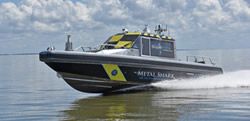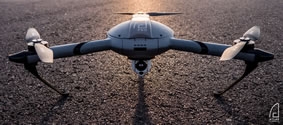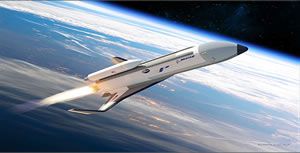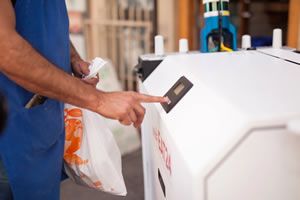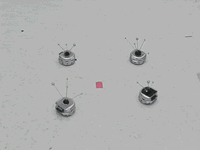Pumping up Productivity: How Robotics are Used in the Oil and Gas Industry
Robotics and automation have greatly enhanced the development of oil and gas by improving maintenance and repair, production efficiency, and safety monitoring.
How Unmanned Underwater Vehicles Could Become Easier to Detect - new research from Draper, MIT
Researchers have developed a passive acoustic remote sensing method for unmanned underwater vehicles, which was demonstrated in Charles River field experiments, pictured here.
How COVID-19 is Accelerating Robot and Drone Technology for use in Everyday Activities
The COVID-19 pandemic has forced changes to our daily lives, but when it comes to technology, not all changes have been unwelcomed. In many ways, shifting the way we live has accelerated the use of technology to a level that we were only beginning to dip our toes into.
Business Perspectives and the Impacts of COVID-19 - Q&A with Parker LORD
Justin R. Bessette, Manager of Technology at Parker LORD, Microstrain shares with us his thoughts on how Parker LORD is managing through the pandemic as well as insights into what the future of Robotics and Automation may be.
Public Benefits of Drone Technology
Drones offer some promising solutions to some of our perennial public challenges. We'll take a look at a few key areas in which they're already starting to make a difference across various community issues.
How Robots Are Changing the Maritime Industry
Advanced robotics are already influencing maritime operations. From the green and eco-friendly benefits offered by regular hull cleanings, to the safer waters achieved through anti-piracy measures, the applications are vast.
Metal Shark and ASV Global Introduce Sharktech Autonomous Vessels
Metal Shark is now offering Sharktech autonomous technology on its entire portfolio of vessels, which range from 16 to over 300 in aluminum, steel, and composite.
World's First Self-driving, Commercial-class Snow Clearing Robot from Left Hand Robotics Operating at Pilot Customer Locations Across North America
The SnowBot Pro is a self-driving, GPS-navigated robot that clears walks more efficiently than shovelers -- dramatically reducing labor costs for snow management operators. The Left Hand Robotics teams deep expertise spans software, automation and robotics, and in 2018 the
Interview with Ivan Tolchinsky, Founder and CEO of Atlas Dynamics
The Atlas Pro is particularly suited to infrastructure inspection, emergency response, security and reconnaissance. The Blue-J fixed-wing UAV is ideally for security HLS missions and long-range infrastructure inspections
Teaching Drones How To Crash Safely
Simon Parkin for MIT Technology Review: Drone delivery wont happen until the unmanned vehicle can master the emergency landing.
DARPA taps Boeing for unmanned reusable spaceplane
Ross Wilkers for Washington Technology: Boeing has emerged as the winner of a DARPAcompetition to design and test an unmanned reusable spaceplane.
Marble and Yelp Eat24 start robot food delivery in San Francisco
Lora Kolodny for TechCrunch: Marble is one of a handful of ventures developing ground-based robots that can navigate autonomously to a customers address. Their machines look like a large kitchen appliance crossed with a Mars rover.
Boeing buys Liquid Robotics to boost autonomous surveillance at sea
Alan Boyle for Geekwire: The Boeing Co. says it has agreed to acquire Liquid Robotics, its teammate in a years-long effort to create surfboard-sized robots that can use wave power to roam the seas.
The acquisition is expected to help Boeing create military communication networks that can transmit information autonomously from the sea to satellites via Sensor Hosting Autonomous Remote Craft, or SHARCs.
Liquid Robotics was founded in 2007 and currently has about 100 employees in California and Hawaii. Once the deal is completed, the company will become a subsidiary of Boeing. The arrangement is similar to the one that applies to Insitu, a Boeing subsidiary that is headquartered in Bingen, Wash., and manufactures ScanEagle military-grade drones. Cont'd...
Swarms of Robots Manage to Not Run Into Each Other
Evan Ackerman for IEEE Spectrum: At Georgia Tech, Li Wang and professors Aaron D. Ames and Magnus Egerstedt have been developing ways to allow infinitely large teams of mobile robots to move around each other without colliding, and also without getting in each other’s way. This is very important for people like me, who have 37Roombas at home, but also for anyone imagining a future where roads are packed with autonomous cars.
The fundamental issue here is robot paranoia. When robots move around, they typically maintain a sensor-based “panic zone” for safety, and if anything enters that space, they panic, and stop moving. If you have only two robots moving around, they can keep clear of one another, but as the number of robots increases, the odds that two “panic zones” will intersect also increases, to the point where they overlap and you just end up with a completely paralyzing global robot freakout. Or as the Georgia Tech researchers put it (in a much fancier way), “as the number of robots and the complexity of the task increases, it becomes increasingly difficult to design one single controller that simultaneously achieves multiple objectives, e.g., forming shapes, collision avoidance, and connectivity maintenance.” Cont'd...
Air Tractor® Makes Entry into the UAS Market - Acquires Yield Defender
Air Tractor, Inc. is expanding into the field of unmanned aerial systems.
Records 1 to 15 of 59
Featured Product

Oriental Motor USA - Ideal for AGV/AMR Applications
The BLV Series R Type brushless DC motor (BLDC motor) speed control system offers the design of motor and driver significantly reduced in size and weight, yet high-power, and contributes to the battery driven automation. The BLV Series R Type is compatible with the two interfaces of Modbus (RTU) and CANopen communication.







